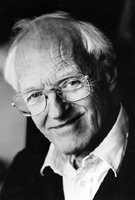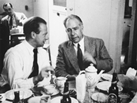Quantum Uncertainty Takes Center Stage
September 6, 2002

Michael Frayn made the uncertainty inherent in human motivation the subject of his play Copenhagen.
Is it ever possible to know a person's intentions, one's own or anyone else's? According to playwright Michael Frayn, it's not: "We do make estimates of intentions, we have to make estimates," he said recently in Berkeley. "My argument is we can never know for certain."
The uncertainty inherent in human motivation is the subject of Frayn's play Copenhagen, as well as the focus of a mathematics event featuring Frayn. Held in Berkeley on April 17, the event was a conversation between Frayn and Robert Osserman, special projects director at the Mathematical Sciences Research Institute.
With his white hair, glasses, and blue socks with brown shoes, Frayn looks like an academic. Once he opened his mouth, however, he showed himself to be a man of the theater, instantly captivating his audience with his stage presence and very British sense of humor. Indeed, Frayn dominated the discussion, adeptly using Osserman's questions as a springboard to say what he wanted to say. His public persona was almost that of a politician, but with considerably more charm.
The Frayn event was part of a series of MSRI-sponsored "conversations" featuring Osserman and authors whose work has mathematical themes. The artistic community, luckily, has done its part---with plays, books, and movies about mathematics appearing at an unprecedented rate, Osserman has had plenty of subjects to interview.
The conversation with Frayn was a bit of a stretch of the "math and theater" theme: Copenhagen is about theoretical physics or, more precisely, about two theoretical physicists. Fittingly, however, there is a mathematical computation at the center of the action: the amount of uranium 235 (the critical mass) required to create an atomic bomb.
Copenhagen concerns a conversation that took place during a 1941 visit of the German physicist Werner Heisenberg to Niels Bohr in Nazi-occupied Denmark. The two men knew each other well: On receiving his PhD, Heisenberg had been appointed Bohr's research assistant, and in the course of a twenty-year collaboration the two had helped lay the foundations of quantum physics.
By 1941, however, they were on opposite sides of a war. Bohr, who was half Jewish, was living in a country under Nazi occupation, while Heisenberg, a professor at Leipzig, was working for the Nazis.
At the time of the visit, Heisenberg was already leading the German effort to build a nuclear fission bomb. His visit to Copenhagen followed a report in a Swedish newspaper suggesting that the Allied forces were working on a uranium weapon, although at the time the Manhattan Project was not yet under way.
Information about the 1941 conversation is limited and often contradictory. What is clear is that there was a conversation, that the subject of nuclear weapons came up, and that Bohr became angry with Heisenberg and broke off the conversation.
Exactly what Heisenberg said, and why, have been debated by scientists for years, but Frayn's play has piqued the interest of a far larger audience. There have been several public debates featuring Frayn and assorted physicists and Heisenberg experts, and a spirited exchange in The New York Review of Books between Frayn and several experts on the topic.
Frayn's play opens to a discussion between Bohr and his wife Margrethe, after their deaths. Together, they explore the events surrounding Heisenberg's visit, while Heisenberg, also dead, responds to the issues brought up and muses about his own actions, but apart from their conversation. Heisenberg then joins Bohr and Margrethe, and together the three create several "drafts" of that fateful conversation, each proceeding a little differently than the others. Throughout, Frayn's characters use ideas from quantum physics as a metaphor for the human issues being discussed. During the draft conversations, and between them, the three characters try to articulate the motives behind the actions, with the central issue being the "uncertainty" surrounding Heisenberg's intentions.
"Life goes by fast; it's hard to understand what goes on as life passes, to understand your own feelings and intentions," Frayn said at the MSRI event. "Part of fiction is to go back and use the advantage of hindsight and reflection to recognize what was going on at the time. . . . One point of the play is that to understand what you're doing yourself, you need to have conversations with other people."
Frayn's play was inspired, he has said, by Thomas Powers's book Heisenberg's War. In it, Powers argues that Heisenberg tried to impede the German effort to build a bomb, deliberately overestimating the critical mass of uranium in conversations with the German authorities to make the project seem infeasible. One possible motive for the visit, explored in the play, is that Heisenberg wanted Bohr to agree to exaggerate the difficulties of building an atomic bomb so that neither side would pursue such a project.
Other authors, such as Paul Rose in his book Heisenberg and the Nazi Atomic Bomb Project: A Study in German Culture, insist that Heisenberg fully supported the Nazi war effort. The visit was simply a spying mission, these authors believe-an attempt to prompt Bohr to reveal what he knew, or even to recruit him for the German bomb effort.
Frayn is generally sympathetic to Heisenberg, both in his portrayal of the character in the play and in public comments. At the Berkeley event, he remarked that he found it "impossible to imagine" that Heisenberg had been sent to Copenhagen to gain Bohr's confidence by telling him about a top-secret German project.
Still, Frayn made it clear that he doesn't subscribe fully to Powers's views. He sees Heisenberg's intentions as far more complicated and opaque---even to Heisenberg. As suggested in Copenhagen, he said, "one reason Heisenberg went to visit Bohr was to find out what he was doing himself."
Frayn does defend the Heisenberg character he created, to whom he seems to have developed a strong attachment. His Heisenberg, Frayn said, is neither heroic nor immoral, but a complex and very human figure.

Werner Heisenberg and Niels Bohr at a conference in Copenhagen. A 1941 visit of the German Heisenberg to his mentor Bohr in Nazi-occupied Denmark is the setting for Michael Frayn's play Copenhagen, itself the subject of an April event at the Mathematical Sciences Research Institute in Berkeley. Photograph courtesy of the American Institute of Physics Niels Bohr Library.
Frayn told of meeting Heisenberg's son Jochen, also a physicist, following a performance of the play. Frayn's Heisenberg, Jochen told Frayn, is nothing like Jochen's father, who never expressed emotion about anything except music. Characters in a play must be forthcoming, Frayn said, adding that he is "certain" the real Heisenberg was as forthcoming as his character, and must have shared some of the feelings his Heisenberg expresses.
Heisenberg certainly had feelings of loyalty toward his country and sought to maintain decency in German science, Frayn said. But not even Heisenberg's greatest critics believe that he was a Nazi or Nazi sympathizer, although they criticize him as too ready to put science at the disposal of an evil cause.
Heisenberg protested the expulsion of Jewish physicists and attempted to find them jobs abroad, Frayn said. He was also considered a sympathizer, and labeled a "white Jew," because he taught relativity, the "Jewish physics" introduced by Einstein. He was told that he could continue to teach relativity as long as he didn't mention Einstein's name. Frayn compared Heisenberg's situation in Germany with that of ordinary citizens in Stalinist Russia. "There, there were many heroes and many compromisers," Frayn said. "I have asked myself how I would have behaved . . . and I find it hard to rush to judgment."
"We should try to understand Heisenberg's behavior, understand their difficulties," he added. "We should be more aware of what we did in our deliberate bombings of civilians in Germany. I think we need to 'fess up' to the consequences of that."
Heisenberg and Bohr said nothing in public about their meeting until the 1950s, when Heisenberg gave his own account of the meeting to Robert Jungk, who was writing a book about the atomic bomb. Heisenberg at that time claimed to have been trying to make a deal whereby neither physicist would contribute to a bomb effort.
On reading Heisenberg's version of events in Jungk's book, Bohr become angry, and drafted and redrafted a letter to Heisenberg indicating that he remembered their conversation quite differently. After the existence of the drafts was revealed in one of the public debates spawned by Copenhagen, the Bohr family decided to release the drafts of the letter, ten years before the scheduled release date. Heisenberg, Bohr wrote in the drafts, had said that he believed the war would be decided by atomic weapons, if it lasted long enough, and that he was heading the effort to build one. Heisenberg had "given no hint" of any efforts by German scientists to impede the bomb project, Bohr wrote, although he acknowledged that a colleague of Heisenberg's had made such hints during a 1943 visit.
In later drafts of the letter, Bohr revealed his own uncertainty about the reason for the visit: "One has wondered in particular how and with what authorization such a dangerous matter, of such great political importance, could be taken up with someone in an occupied and hostile country."
"What strikes me as amazing about Bohr's letter is that it confirms that Heisenberg indicated clearly that the Germans were working on the A-bomb and that Heisenberg said it couldn't be done and he was in charge of the German project," Frayn said. "This seems to me to be absolutely astonishing."
Asked by a member of the audience whether knowing the contents of Bohr's letter would have changed his play, Bohr replied: "Not really." He added: "I do wish I'd had the letter, and perhaps I would have written the play slightly differently, making Bohr more forthcoming in his criticisms of Heisenberg."
Given all the discussion of motives and intentions, it seemed reasonable to ask Frayn about his intentions in writing his play: Why did he write about science? Did he know he had a hit? Did he hope to spark a public debate about Heisenberg?
Frayn said that he had included science only because it was part of the story and that he had had no idea Copenhagen would be such a success. "Everything about the theater is uncertain," he said in Berkeley. "When I wrote Copenhagen, I didn't think anyone would produce it, and even if I managed to find a small theater that would, I didn't think anyone would come to see it."
Sara Robinson is a freelance writer based in Berkeley, California.

